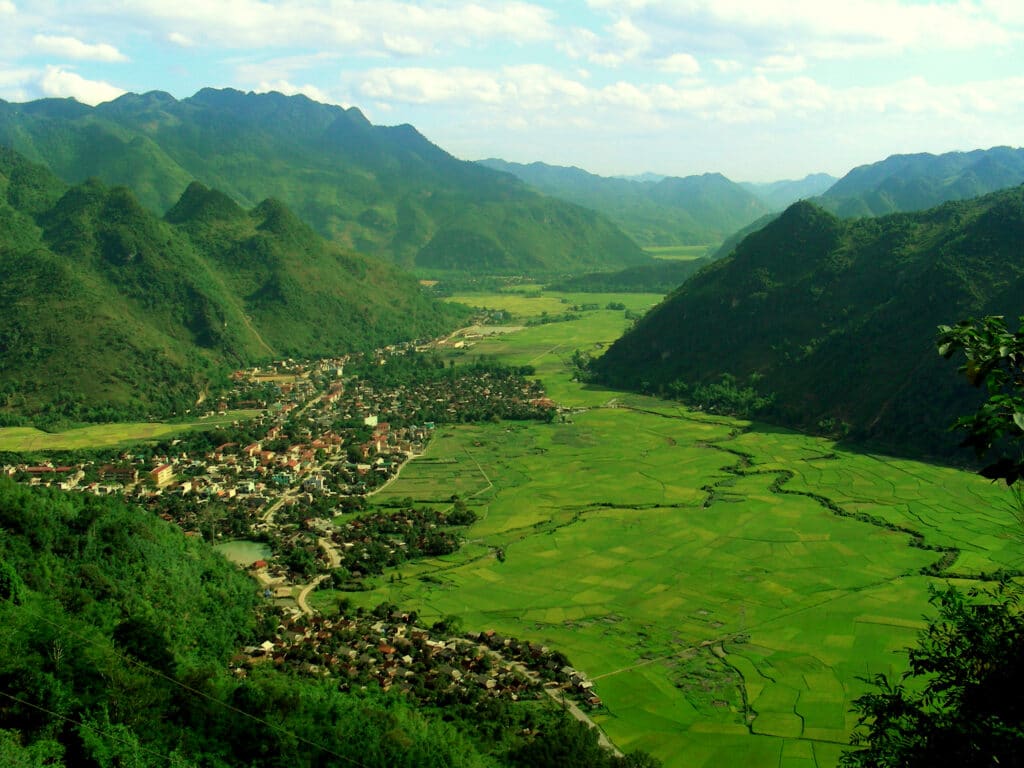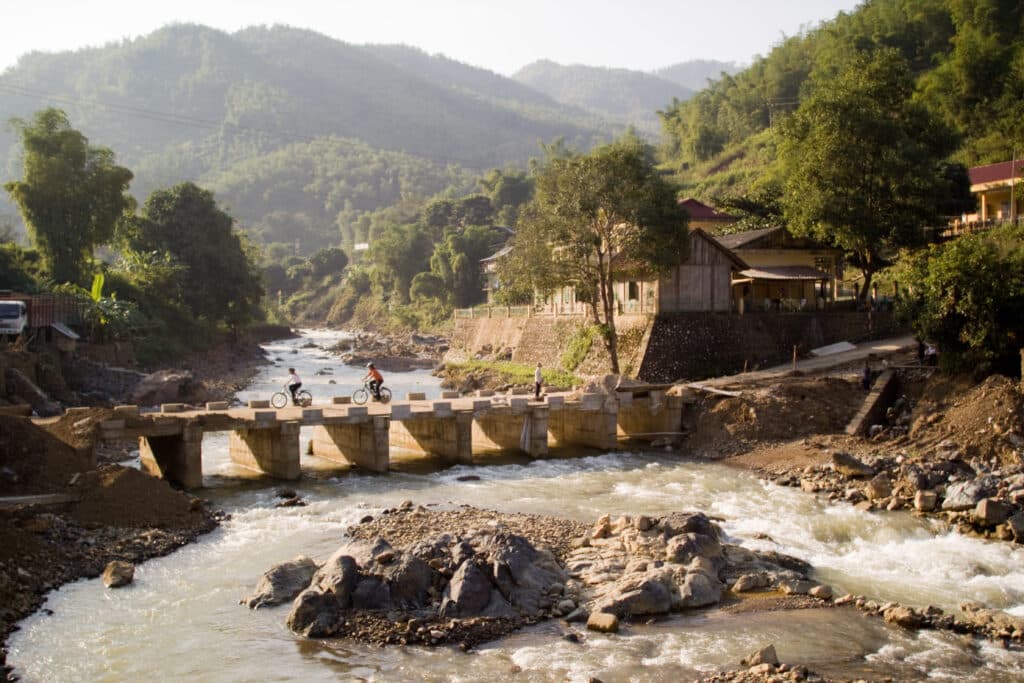An Inspiring Educational Travel Case Study: Chau in Mai Chau
It has been an enlightening and heartwarming experience to delve a little deeper into the work of the educational travel team.
So far, we have examined the trials and tribulations of Phuong Doan and detailed the achievements of Chi Ngo in Vinh Long, southern Vietnam. In this piece, we head north from there to Mai Chau, the original project in Vietnam, to hear the inspirational story of Chau.

Chau’s story epitomises our belief in investment in local people. He has steadily risen from humble cook to Project Manager for Mai Chau – the exemplar case study. His example shows how Discova’s support and training can combine with enthusiasm and passion – and a healthy dose of friendly smiles along the way – to result in an efficient local leader immensely beneficial to his community and all involved.
Let’s learn more about his work.
Interviewed by George Robinson
On the Beginnings
Chau speaks limited English, so we communicate with the help of Phuong, another member of the educational travel team, who translates for Chau. Even without understanding his words, I get a feel for his personality immediately – very smiley, demonstrative in hand gestures and tone of voice. Even as an outsider, I can appreciate his storytelling technique and see why he is popular with travellers and fellow villagers alike.
His initial job was with one of our suppliers, cooking and serving meals for the passengers in our educational travel groups. He had been a cook since 2003.
He seems to have made an impression from this position. He knows everybody in the village and takes the time to say hello and build good relationships with everybody he meets. Naturally jovial, talkative, and easygoing, he was invited to escort groups and participate in organising some activities for visitors. This was seven years ago.
It all seems simple laying out his career progression like this. When the opportunity arose with a vacant position as Project Manager, he was tentatively invited to apply. Through our discussions with the educational travel team, we have seen that the development of team members is a key pillar of working with Discova, and these transformative stories can be found throughout the business.
Chau was eager to take on the responsibility but admits he was a bit nervous. Wary of his lack of technological skills, he thought that his level of expertise may be a problematic shortcoming.
Nevertheless, demonstrating the growth mindset so characteristic of the department, he came to Hanoi for training. He then headed to Laos for some shadowing experience on another of our projects to learn more about the role.
In essence, he flourished.
On Being a Project Manager
The role of the project manager is broad in scope and responsibility. Chau must act as an efficient go-between for all parties – a mediator between villagers, Discova, and the visiting groups themselves.
Chau explains that he can split the leadership role into two parts, and it is helpful to think of our educational travel services in this way, too. When a visiting group of students or travellers arrive in Mai Chau, their week is essentially spent pursuing two types of activity.
One of these will be some kind of project, which may vary depending on the visiting group. The other side will be cultural immersion activities. For instance, the day is usually split into two halves. The visitors spend the morning working on a project, say building a bridge for the village. Then, after lunch, they will learn more about Vietnamese culture through some form of hands-on experience, like a cooking class or a crafting workshop. In short, it’s a mixture of fun and fulfilment.
And Chau needs to organise it all.
He must make sure everything runs smoothly, from safety to supply issues, from schedules to the skillsets of travellers.
On Building Projects
Chau has overseen the successful completion of several construction projects – and it’s these that he immediately turns to when I ask him of his proudest achievements.
Together with the community and visiting groups, Chau has built a bridge, a dam, toilets for the school, a new drainage system and other infrastructure improvements for the village of Mai Chau.
Chau explains the democratic process through which projects are decided upon at the village level. Through Discova, we allocate $2 per traveller to the village fund. Donations and fundraising activities are added to this to create the village budget for improvements.
It is then Chau’s responsibility to coordinate all efforts towards implementing the decided course of action. That means buying supplies and materials, hiring professionals if necessary, setting up a workflow for travellers to contribute, and allocating the village’s resources.
Chau looks off into the distance as he speaks, and I wonder what he is reflecting upon with his enigmatic smile. Both my Vietnamese colleagues are laughing together, reminiscing over his story. It turns out he is talking about his skills as a haggler, bargaining with builders and striking a good deal.
The nature of the work means Chau has to be very careful with costs. Since Mai Chau is remote, transport costs are high for materials to reach the village. Nevertheless, charming Chau works his magic with the contractors more often than not.
While relatively comfortable working within the field of construction, Chau also has to negotiate prices for medical supplies and nursing equipment for our medical student groups. These are complex processes, and Chau has increased his knowledge and honed his negotiating skills over time.
It’s all about value for the village – how can he achieve as much as possible from as little as possible, remembering that all costs for the project are entirely transparent.
On Building Relationships
During his telling of the construction projects, Chau explains that it took the work of 7 consecutive visiting groups to complete the dam.
I pause to reflect. It must be extremely challenging to organise the logistics of this. I’m sure that not many foremen would put up with a merry-go-round of revolving unskilled labour. It prompts a simple question – how does anything get done?
Chau laughs good-naturedly through his explanation, with perhaps a knowing hint that it seems difficult to imagine.
His essential answer is teamwork and leading by example.
He gives a detailed safety briefing before setting out to do any work. This is translated for the visiting travellers – this is the foundation.
The work then proceeds step by step, brick by brick, as the travellers follow the lead of their Vietnamese counterparts. They are given a task for the day, and they don’t need to overcomplicate things by contemplating the overall project. The overall project is Chau’s and his fellow experts’ responsibility.
This is how structures take shape. Chau and the villagers have become body language experts to communicate. Though not proficient in English, Chau has developed a sizeable vocabulary within the lexical field of construction to help push things along. Yet, there are facilitators on hand to translate too, if travellers require – this offers support to the foundation.
And through it all, relationships are forged in cooperation. Smiles and encouragement – this is the cement that melds it all together.
I comment that Chau has talked mainly of the project side. Doesn’t he get involved with all the fun, too?
Once again, they both laugh at the question. Phuong takes over, putting her hand up to say she can answer that question for Chau. She gives a resounding “Yes!” and they both proceed to laugh, shoulders shaking away with even a bit of thigh slapping too.
Enough said, I guess.
On Building for the Future with Educational Travel
I finish by asking Chau about his plans for the future. Whenever speaking with people from our communities, the elephant in the room is that most talk of travellers visiting is in the past tense. The long enforced break has meant there has not been many international travellers contributing to the villagers’ fund.
However, Chau says that he has still pursued some small projects for the village with the limited money available. A new tv was bought for the school. There have been a few small scholarships for some of the disadvantaged students in the area.
He has also endeavoured to help spruce up many houses in the village. Many of the farmers’ houses are functional; they serve the purpose they were designed for and offer little in the way of decoration. So, Chau has helped the village with gardening, painting, and general cleaning to help prepare the community for the return of tourists. This way, more of the houses can be appropriate for homestays for visiting groups.
His personal aim is to learn a little more English for when travellers return!
Chau has a heartfelt moment towards the end of our conversation. He returns to that idea of being nervous and claims that the most significant help he received in getting over this was that he had the full support of his community.
He felt the burden of new responsibility, but it meant a lot that the villagers backed him to advocate for them.
Chau wants to continue working for Discova, planning future projects and welcoming travellers to learn about Vietnamese culture – and it’s mainly so he can continue to repay their faith in him.
If you want to learn more about the work of our educational travel team, don’t hesitate to get in touch and start a conversation about how we can work together.
Let’s talk
Educational Travel
Request a quote, book a meeting, ask a question, or share a dream
Receive news like this directly in your inbox
Subscribe to the dedicated Discova Educational Travel mailing list
